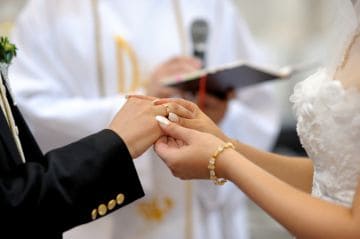Home / Family law / Marriage
Back
Published: 10/16/2016
Reading time: 7 min
0
1139
The requirement to reach the legal age is one of the main ones for carrying out such a procedure as registering a marriage between two citizens.
In the vast majority of cases, they can get married only after they reach adulthood.
However, if there are compelling reasons and certain legal requirements are met, marriage registration is also allowed between minors , which will be discussed in detail below.
- Legislative regulation
- Conditions Availability of permission from local authorities
- Availability of valid reasons
Age of marriage
According to the law, citizens who have reached the age of 18 can freely create a family ( Article 13 of the Family Code of the Russian Federation ). And this age was not established by chance: the future spouses received a certificate of secondary education and are able to work. Adult citizens have the right to marry without parental consent .
Good reasons allow you to get married at 16 years old ( clause 2 of article 13 of the RF IC ). However, the local administration has the right to further reduce the age of those getting married. For example, in the Moscow region it is allowed to start a family from the age of 14, and in the Murmansk region - from the age of 15.
Age limits apply equally to both men and women. But it should be remembered that communication with minors is criminally punishable. If one of the lovers has reached the age of majority, then law enforcement officers may become interested in the relationship. The conclusion of an official marriage is not a mitigating circumstance in such cases. The situation can be aggravated by relatives: they have the right to demand annulment of the marriage through the court.
Conditions
In the above part 2 of Art. 13 of the RF IC provides the following list of conditions under which marriage between minors is possible:
Availability of permission from local authorities
In particular, such permission can be obtained from the heads of administrations of cities, districts and districts in cities.
Similar documents from other bodies or officials have no legal force.
To obtain permission, minors or their legal representatives (parents, guardians, trustees) must submit a corresponding application to the authorized body, attaching certain documents to it. These documents can be any papers confirming the existence of compelling reasons for marriage. Their specific types depend on the situation.
Each situation is considered individually , after which a separate permit is also issued for a particular applicant. In other words, the local government cannot issue a document allowing or prohibiting the registration of a marriage union for absolutely all persons under 18 years of age.
Availability of valid reasons
The legislation does not contain any list of these reasons that would definitely be considered valid, so in most cases the decision on their significance is made by local governments.
The most popular grounds that are taken into account in practice include:

- bride's pregnancy;
- the birth of a joint child;
- the presence of an immediate threat to the health or life of one of the parties;
- conscription of the groom for compulsory military service;
- an actual marriage (that is, the couple living together and running a household).
This list is far from exhaustive, so parties can obtain permission in many other cases.
The final decision on this is made only by the local government, taking into account all existing conditions and circumstances.
In addition, many constituent entities of the Russian Federation have their own grounds for formalizing relations between minors, formalized in the form of separate legislative acts. Moreover, some of them allow marriage even before the age of 16 (but at least from the age of 14), if there are appropriate serious reasons for this.
Another basis for marriage is the emergence of full legal capacity in a minor, which occurs if he, for example, begins to officially work or engage in entrepreneurial activity.

In this case, he receives all the rights and responsibilities of adults, including marriage. A conclusion on obtaining full legal capacity can be obtained through the court.
As for parents or other legal representatives of minor citizens (guardians, trustees), their consent to marriage is not necessary, but is highly desirable. It is also worth noting that their refusal to provide consent to this can be appealed in court.
If it is impossible to obtain permission from the parents, future spouses need to apply for it to the guardianship and trusteeship authority at the place of their registration. However, it will be given only if the parties are able to prove the weight of the grounds for this.
It is also worth considering that compliance with the general conditions that apply to registration of marriage is mandatory.
These include:
- the voluntariness of the decision of each of the parties - both the groom and the bride must independently want to get married, without any pressure from outsiders;
- the absence of an already registered marriage on one of the parties - since polygamy is prohibited in Russia, all previous unions (if any) must be terminated;
- capacity of persons - neither party should be declared incompetent due to mental illness;
- lack of family ties - in particular, marriage between parents and children, adoptive parents and their wards, brothers and sisters, grandchildren and grandparents is not allowed.
If at least one of these conditions is not met, even an officially registered marriage may be declared invalid.
The procedure for recognizing it as such is no different from situations when relationships are formalized between adult citizens.
Good reasons
The legislation does not establish a strict list of situations when early marriage is possible. The decision on the possibility of marriage is made by local government bodies on the basis of the submitted documents. Therefore, the couple should definitely justify their desire to start a family. For example, provide a medical report.
Valid reasons may include:
- the onset of pregnancy;
- birth of a child;
- long-term cohabitation and housekeeping;
- employment of the couple, independent financial support;
- serious illness of one of the newlyweds.
The list is not final, since the situations arise are very diverse. If the municipality does not consider the arguments weighty enough for marriage, then the decision will have to be appealed in court.
No valid reasons
Theoretically, minors can express a mutual desire to get married if the bride is not pregnant. In this case, an application to reduce the marriageable age is submitted only with the consent of the parents. Further developments depend on the decision of the local administration.
Reasons for underage marriage
Article 13 of the Family Code indicates that in the presence of certain valid reasons (in certain cases), local government bodies (usually district or city administrations) have the right to allow persons who have reached the age of incomplete legal capacity, that is, sixteen years, to marry.
But the legislation does not provide a list of such reasons, so they can be identified based on already established practice:
- pregnancy;
- actual relationship (civil marriage);
- presence of common children;
- threat to life;
- the groom's conscription for military service.
Parental permission is not required for such a marriage.
Legal consequences of early marriage
Starting from the age of 16, a teenager can obtain the status of full legal capacity. In this case, he is considered emancipated and has the right, on an equal basis with adults:
- get officially employed;
- to do business;
- enter into marital relations.

A citizen is recognized as emancipated only by the guardianship and trusteeship authorities with the consent of the parents. If the authorized body refuses to emancipate a teenager, then support can only be obtained in court. After the procedure has been successfully completed, adults (parents, adoptive parents) are not responsible for the further actions of the minor.
Emancipated newlyweds have the right to regulate their relationship by concluding a marriage contract. In the event of a divorce, the former spouses do not lose their legal capacity.
Despite the fact that emancipated citizens are recognized as having full legal capacity, they cannot get married without the consent of local governments. You will need to provide documents confirming valid reasons.
Invalid marriage
If the future newlyweds violated the requirements of the Family Code when getting married, then such a union is declared invalid by the court ( Article 27 of the RF IC ). The initiator of the lawsuit can be one of the spouses or his parents.
Reasons for invalidating a union:
- lack of permission to lower the marriageable age;
- one of the newlyweds is already in a registered marriage;
- the bride and groom are close relatives;
- one of the partners is declared incompetent by the court;
- Early marriages are prohibited in the region of residence.
Relatives also have the right to go to court if they suspect one of the parties of fraud for the purpose of enrichment. The marriage will be considered fictitious and annulled.
Video on the topic
Minimum age for marriage
or
marriageable age
is the age at which a person acquires the right to marry independently, as well as with parental or other consent.
The age of marriage depends on the country and may be different for girls and boys. Until recently, the age of marriage for girls in many countries was lower than for boys, but has now been raised to the age of boys in many places to maintain gender equality. The age and other conditions required for marriage vary from country to country, but are generally set at age eighteen. Most countries allow marriage at an earlier age, with parental consent or judicial approval, and some countries also allow young people to marry if the girl is pregnant. The age of consent should not be confused with the age of majority or the age of sexual consent, although in some places they may be the same thing. In many developing countries, official regulations on the age of consent are merely guidelines. In some societies, marriage to a person (usually a girl) under the age of 18 is considered child marriage. 55 countries in 1962 adopted the Convention on the License of Marriage, Minimum Age for Marriage and Registration of Marriage to legislate the minimum age for marriage, as well as the abolition of customary, religious and tribal laws in this regard.
When the age of marriage is lower under religious law than under the law of the country, then the law of the state prevails. However, some religious communities do not accept the rule of state law in this matter, which can lead to child marriage or forced marriage. The 123 parties to the 1956 Supplementary Convention for the Abolition of Slavery agreed to a minimum age for marriage.
History and social relations
Historically, the age of consent for sexual union was determined by tribal custom or subject to family discussion and decision. In most cases, it coincided with the appearance of signs of puberty: menstruation for a girl and the appearance of pubic hair for a boy.
In ancient Rome, it was customary for a girl to get married and have children soon after puberty. Roman law required the bride to be at least 12 years old. According to Roman law, first marriages for brides aged 12 to 24 required the consent of the bride and her father; but, at the end of the ancient period, Roman law allowed women over 25 to marry without parental consent. Catholic canon law followed Roman law, but in the 12th century the Catholic Church dramatically changed the legal rules regarding marital consent, allowing girls over 12 and boys over 14 to become engaged without parental approval, even if they were married in secret. Parish research confirmed that late medieval women sometimes married against their parents' consent. The Catholic Church's policy of validating secret marriages and marriages without parental consent was controversial, and in the 16th century the French monarchy and the Lutheran Church attempted to end the practice with limited success.
In Western Europe, the influence of Christianity and manorism increased, which created incentives to maintain nuclear families and thus the age of marriage increased; The Western Church instituted marriage laws and customs, marriage laws and practices that undermined large kinship groups. Already from the 4th century, the church abstained from any customs that could lead to an increase in the family, such as adoption, polygamy, cohabitation outside of marriage, divorce and remarriage. The Church has strongly discouraged and prohibited consanguineous marriage, a model of marriage that has provided a means to preserve the lineage (and thus its power) throughout history. The Church also prohibited marriages in which the bride did not give explicit consent to the union. After the fall of Rome, manoralism helped weaken the ties of blood kinship and thus the power of the clans; As early as the 9th century in northwestern France, families who worked on estates (manors) were small, consisting of parents and children, and sometimes grandparents. Church and state become allies in erasing the cohesion and thus the political power of the clans; The church sought to replace traditional religion, which was the connecting link of kinship groups, and substituting the authority of the elders of the kinship group with, despite the antiquity of the religion; At the same time, the power of the king was undermined by uprisings on the part of the most powerful kinship groups, clans or sections, whose conspiracies and murders threatened the power of the state, and also demanded from the owners of the estate (manor) the obedience and pliability of the workers. Just as peasants and serfs lived and worked on farms that they rented from the landowner, so they had to ask the master’s permission to marry; couples, therefore, had to obey the owner of the estate and wait until a small farm was vacated or made available to them so that they could marry and have children; those who could and delayed marriage apparently received a reward from the landowner, those who could not were left without the above-mentioned reward. For example, in medieval England, marriageable age can be seen as a variable depending on economic circumstances, couples delayed marriage until the late 20s, as times were bad at that time and the average teenage age dropped after the Black Death when there was a shortage of workers, there is that teenage marriages in England were not the norm. In medieval Eastern Europe, on the other hand, the patrilocality* of Slavic traditions delayed early and universal marriages (usually brides aged 12-15, with menarche averaging 14), the manorial system was just making its way into eastern Europe and had less influence there were no strict prohibitions on consanguineous marriages on the clan system there.
The first recorded legal age law dates back 800 years. In 1275, in England, as part of the law on rape, the Statute of Westminster 1 made it a crime to “abduct” a “maiden within age” (English: maiden
within age
), with or without her consent.
The phrase "within age" was interpreted
by the jurist Sir Edward Coke to mean under the age of marriage, which at that time was 12 years. In the 12th century, the jurist Gratian, the influential founder of canon law in medieval Europe, set the age of puberty for marriage between 12 and 14 years, but marriage agreements could be made for children over 7 years of age. There have been authoritative statements that consent to marriage could have been given at an earlier age. The marriage will then be valid as long as neither of the two parties dissolve the marriage agreement before reaching puberty, or enter into marital relations. It should be noted that the Court recognized marriages based on marriage agreements concluded under the age of 7 years, despite the words of Gratian; There are records of marriages of 2 and 3 year old children.
The American colonies followed English tradition, but the law was no more than a guide. For example, Mary Hathaway (Virginia, 1689) was only 9 years old when she married William Williams. Sir Edward Cox (England, 17th century) clarified the situation: “marriage of girls under the age of 12 was considered the norm, and the age at which a girl who was a wife and had the right to part of the inheritance from her husband’s property was 9 years old, although her my husband was only four years old.” Reliable data on the age of marriage is very difficult to find. In England, for example, there is reliable data on marriageable age at the beginning of the modern era, which comes from the records only of those who left property on their death. Not only are the records relatively sparse, but not all records bothered to indicate the ages of the participants, and it seems that the more complete the record, the greater the chance of finding young marriages. In addition, historians of the XX-XXI centuries. sometimes show reluctance to accept data on a young age at marriage, instead explaining that existing records are distorted due to misreading of ancient copies of records.
In France, before the French Revolution, the age of marriage was 12 for girls and 14 for boys. Revolutionary legislation in 1792 raised the age to 13 for girls and 15 for boys. After the adoption of the Napoleonic Code in 1804, the age of marriage was set at 15 years for girls and 18 years for boys. In 2006, the marriageable age for girls was increased to 18 years, the same as for boys.
In recent years, there have been changes in the marriage age for girls and boys, which were eventually equalized and set at 18 years old for that period. In countries where ages are not the same, the age of marriage for girls is usually 2 or 3 years younger than for boys.
Marriage age: right or exception
In most countries the age of marriage is generally 18 years. However, most of these countries have exceptions for minors requiring parental and/or judicial permission. These exceptions vary significantly by country. The United Nations Population Fund has established the following:
In 2010, 158 countries reported that 18 years was the minimum age for marriage for women without parental or judicial consent. However, in 146 countries, government law or custom allows a girl under 18 to marry with the consent of her parents or other authorities; In 52 countries, girls under the age of 15 can marry with parental consent. In contrast, 18 is the legal age for non-consensual marriage among men in 180 countries. Additionally, in 105 countries, boys can marry with parental or appropriate authority's consent, and in 23 countries, boys under 15 can marry with parental consent
In Western countries, teenage marriages have become rare in recent years, with their frequency falling sharply over the past few decades. For example, in Finland, where minors can obtain special judicial permission to marry, today there are only 30-40 such marriages per year (and most spouses are 17 years old), while in the early 1990s more than 100 underage marriages.
Statistics by country
In the following tables, if the "Female Allowed (Years)" cell is blank, the contents of the "Men Allowed (Years)" cell indicate the general minimum age.
Africa
| A country | Allowed for men (years) | Women allowed (years) | Notes |
| Algeria | 19 | ||
| Angola | 18 | with parental consent for men from 16 years old, for women from 15 years old. | |
| Cameroon | 15 | 18 | |
| Egypt | 21 | with parental consent from 18 years of age. | |
| Ethiopia | 18 | ||
| Kenya | 18 | for men with parental consent from 16 years of age. | |
| Lesotho | 21 | with parental consent for men over 18 years old, for women over 16 years old | |
| Liberia | 21 | 18 | with parental consent for men over 18 years old, for women over 16 years old |
| Libya | 20 | may be reduced by court decision if it is based on benefit or necessity, and with the consent of the wali. | |
| Mauritius | 18 | with parental consent from 16 years of age | |
| Madagascar | 18 | 17 | |
| Mali | 18 | 16 | |
| Mauritania | 18 | Despite the legal age for marriage, judges can use their discretion to marry even minors. | |
| Morocco | 18 | The age of marriage criterion is not always followed in rural areas, and many judges do not adhere to this law and allow women under 18 years of age to marry. | |
| Mozambique | 18 | with parental consent from 16 years of age | |
| Namibia | 21 | with parental consent from 18 years of age | |
| Niger | 18 | 15 | it is possible to get married earlier with the consent of the parents |
| Nigeria | 18 | ||
| Sao Tome and Principe | 18 | with parental consent for men from 16 years old, for women from 14 years old. | |
| Senegal | 18 | 16 | |
| Somalia | 18 | 16 | For women with the consent of the guardian. The court may grant an exemption from the minimum age if necessary. |
| South Africa | 18 |
| |
| Sudan | Puberty | Voluntary consent of both parties is required | |
| South Sudan | 18 | With the consent of both parties, in accordance with the South Sudan Children's Act 2008 | |
| Swaziland | 21 | with parental consent for men over 18 years old, for women over 16 years old | |
| Tanzania | 18 | with parental consent from 14 years of age | |
| Togo | 20 | 17 | |
| Tunisia | 18 | Younger with special judicial permission for urgent reasons and clear interest of both spouses | |
| Zambia | 21 | ||
| Zimbabwe | 18 | with parental consent from 16 years of age | |
Asia
| A country | Allowed for men (years) | Women allowed (years) | Notes |
| Afghanistan | 18 | 16 | In some cases, young girls are forced to marry at the age of 8 |
| Bangladesh | 21 | 18 | Bangladeshi law imposes penalties for underage marriages, although such unions are not invalidated. Despite the law, the rate of child marriage in Bangladesh is one of the highest in the world. Every 2 out of 3 unions are child marriages. |
| Butane | 18 | ||
| Brunei | 18 | The minimum legal age for marriage without parental consent varies among states/provinces, ethnic groups, religious groups, or forms of marriage. | |
| Cambodia | 16 | 13 | |
| China | 22 | 20 | |
| Hong Kong | 21 | with parental consent from 16 years of age. | |
| India | 21 | 18 | If either partner married at a younger age, he or she can seek annulment of the marriage. Recent Law Commission recommendations seek to equalize the age of marriage for men and women under 16. Official policy automatically declares marriages under 15 to be "null and void", while marriages aged 14 or 15 are "voidable". In 2012, the Supreme Court said Muslim women could marry at 15 years of age. Moreover, the report states that “despite these legal provisions, child marriage is still widely practiced and a marriage contracted in violation of these provisions is not void, even under the new PCMA (1929), Hindu Marriage Act (1955), and also following Islamic law." |
| Indonesia | 19 | 16 | Marriage before age is legal with parental and judicial consent |
| Iran | 18 | 15 | With judicial consent for men from 15 years old, for women from 13 years old. |
| Iraq | 18 | From 15 years of age with judicial permission, if suitability, physical capabilities and consent of the guardian (or unreasonable objection on the part of the guardian) are established. | |
| Israel | 18 | The minimum age for marriage increased to 17 years on November 18, 2013. The family may have the court recognize the marriage for those aged 16 and above in special cases. | |
| Japan | 20 | with parental consent for men over 18 years old, for women over 16 years old | |
| Jordan | 18 | ||
| Kazakhstan | 18 | 17 | with parental consent from 16 years of age |
| South Korea | 19 | with parental consent from 18 years of age | |
| Kuwait | 17 | 15 | |
| Kyrgyzstan | 18 | If there are good reasons, the executive bodies of local government at the place of residence of persons wishing to get married have the right, at the request of these persons, to reduce the marriageable age for men and women by no more than one year (17 years) on the basis of a commission conclusion of the territorial divisions of the authorized state body for child protection. | |
| Lebanon | 18 | 17 | for men from 15, for women from 9 years with judicial permission for Shiites. From 18 years for men and 17 for women, or from 16 for men and 15 for women with judicial permission for Druze. |
| Malaysia | 21 | from 18 years of age with parental consent. Muslim girls under 16 years of age can marry with Sharia consent | |
| Maldives | 18 | According to custom, the minimum age for marriage is 15 years. The Child Rights Protection Act prohibits marriages before the age of 16. | |
| Nepal | 20 | with parental consent from 18 years of age | |
| North Korea | 18 | 17 | |
| Oman | 18 | While the legal minimum age is 18, custom still recognizes marriages under the age of 18 | |
| Pakistan | 18 | 16 (18 in Sindh) | Despite the law prohibiting child marriage, the practice is widespread. Based on two 2013 reports, more than 50% of all marriages in Pakistan involve girls under 18 years of age. Another UNICEF report states that 70% of girls in Pakistan were married before the age of 16. There is also a custom in Pakistan called quarrel or |
| Palestine | 16 | 15 | With parental consent |
| Mongolia | 18 | ||
| Philippines | 21 | with parental consent from 18 years of age | |
| Qatar | 18 | 16 | Earlier in age - with parental consent. There is no minimum age for marriage with parental consent, only permitted in accordance with religious and cultural norms, and with the permission of a competent court |
| Russia | 18 | from 16 years of age under special circumstances; may vary in different regions. | |
| Saudi Arabia | No | ||
| Singapore | 21 | With parental consent from 18 years of age; after 18 with a special marriage license. | |
| Sri Lanka | 18 | However, the parties must have the Qadi's permission to marry before entering into a marriage contract if they are Muslims | |
| Syria | 18 | The Thomson Reuters Foundation notes that child marriages occur from 13 years of age | |
| Taiwan | 20 | with the permission of the statutory agent for men from 18 years of age, for women from 16 years of age. | |
| Tajikistan | 18 | with parental consent from 17 years of age | |
| Thailand | 20 | with parental consent from 17 years of age | |
| United Arab Emirates | 18 | As long as the UAE is subject to Sharia law, there is a minimum age for marriage | |
| Uzbekistan | 17 | ||
| Vietnam | 20 | 18 | |
| Yemen | 15 | Human Rights Watch notes that there is no legal minimum age for marriage under Sharia law, and the UN Statistics Division also notes that child marriage is permitted where "there is some demonstrable benefit to such marriage." | |
Europe
The age of marriage as a right is set at 18 years in all European countries, with the exception of Andorra, Malta and Scotland, where it is 16 years (for both sexes), and Azerbaijan, where it is 17 years for women. There are exceptions to this general rule (for example, special judicial and/or parental consent is required). In the European Union and Council of Europe, the age of consent is within the jurisdiction of individual member states. The Istanbul Convention, the first legal restrictive instrument to prevent and combat violence against women and domestic violence, required countries that ratify it to prohibit forced marriages (Article 37) and to ensure that forced marriages can be easily annulled without further victimization (Article 32 ), but makes no mention of the minimum age for marriage.
| A country | Allowed for men (years) | Women allowed (years) | Notes |
| Albania | 18 | ||
| Andorra | 16 | with judicial permission from 14 years of age | |
| Armenia | 18 | The marriage age of 18 for both sexes was established in 2012; before that it was 1 for women and 18 for men. However, marriage at the age of 17 is permitted with parental consent, and at the age of 16 with parental consent and provided that the other spouse has reached at least 18 years of age. | |
| Austria | 18 | from 16 years of age with parental consent, but the other partner must be 18 years of age or older | |
| Azerbaijan | 18 | 17 | in special cases for men from 17 years old, for women from 16 years old |
| Belarus | 18 | ||
| Belgium | 18 | Earlier age - with judicial consent (without a strict definition of the minimum age for marriage). With the consent of the parents, if there are serious reasons for the minor to marry; without parental consent - non-consent must be abuse. | |
| Bulgaria | 18 | The New Family Code (2009) sets the age of marriage at 18, but allows exceptions for 16-year-olds, stating "As an exception, if there are compelling reasons, marriage may be contracted by a person under the age of 16 with the permission of a regional judge." In addition, it states that both persons wishing to marry, as well as the parents/guardians of the minor, must consult with a judge (Chapter 2, Article 6). | |
| Croatia | 18 | with the consent of the court from 16 years of age | |
| Cyprus | 18 | with parental consent from the age of 16, if there are serious reasons for marriage | |
| Czech Republic | 18 | Article 672 of Law No. 89/2012 of the Civil Code (came into force in 2014) states that the court may, in exceptional cases, allow marriage from the age of 16, if there are serious reasons for this. | |
| Denmark | 18 | from the age of 15 with a benefit called "Kongebrev" (the so-called "letter from the king"). | |
| Estonia | 18 | with judicial permission from 15 years of age | |
| Finland | 18 | Before 18 years of age, with the consent of the Ministry of Justice in emergency circumstances, about which the opinion of the parents or guardian is heard, but in fact the consent of the parents is not required. | |
| France | 18 | with the consent of the court and both parents until the age of 18 | |
| Georgia | 18 | with parental consent from 16 years of age | |
| Germany | 18 | with the permission of the court and parental consent from 16 years of age | |
| Gibraltar | 18 | ||
| Greece | 18 | Before 18 years of age, court permission is required, which can be given if there are serious grounds for such a marriage | |
| Hungary | 18 | with parental consent from 16 years of age | |
| Iceland | 18 | Previously 18 years of age with parental consent and permission from the Ministry of Internal Affairs. | |
| Ireland | 18 | with court permission from 18 years of age | |
| Italy | 18 | With judicial permission from 16 years of age | |
| Latvia | 18 | with judicial and/or parental consent from 16 years of age | |
| Lithuania | 18 | from the age of 15 with the permission of the court, minors can marry before the age of 15 with the permission of the court if they are pregnant | |
| Luxembourg | 18 | A new law in 2014 fixed the age of consent at 18 for both sexes; before this, the age was 16 for women and 18 for men. New laws still allow both sexes, with judicial consent, to marry before age 18 | |
| Netherlands | 18 | under 18 years of age with the permission of the Minister of Justice; up to 16 years of age with parental consent, in case of pregnancy | |
| Norway | 18 | from 16 years of age with the consent of the parents (guardian) and the permission of the district governor. The district governor can only grant permission when there are "special reasons for marriage" | |
| Malta | 16 | The age is set at 16 years regardless of parental consent | |
| Poland | 18 | for women over 16 years old with the consent of the court | |
| Portugal | 18 | with parental consent from the age of 16 (or, if it is impossible to obtain consent from parents, it can be given by a court). | |
| Romania | 18 | from 16 years of age with the permission of the district administrative council | |
| Russia | 18 | from 16 years of age in special circumstances, but the rules vary in some regions | |
| Serbia | 18 | from 16 years of age with judicial consent | |
| Slovakia | 18 | from 16 years of age with judicial consent in the presence of serious reasons such as pregnancy | |
| Slovenia | 18 | from 15 years old with parental consent | |
| Spain | 18 | from 16 years of age with judicial consent | |
| Sweden | 18 | up to 18 years of age with the permission of the county government (LST). The District Administrative Council can only grant permission when there are "special reasons", but although guardians of minors must be heard if possible, their consent is not required. Although the law does not specify a lower age for marriage, LST's policy is not to grant any permits to people under the age of 15. | |
| Switzerland | 18 | ||
| Türkiye | 18 | from 17 years of age with parental consent, from 16 years of age in special circumstances with judicial permission. | |
| Ukraine | 18 | The age was set at 18 for both sexes in 2012, but courts can still grant permission from 16 years old if there are special reasons | |
| Great Britain | 18 (16 for Scotland) | England and Wales: from 16 years of age with parental consent Scotland: from 16 years old Northern Ireland: from 16 years of age with parental consent (in some cases consent may be given by the court) | |
North America and Central America
| A country | Allowed for men (years) | Women allowed (years) | Notes |
| Antigua and Barbuda | 18 | from 15 years old with parental consent | |
| Bahamas | 18 | The Marriage Act (1908) does not specify a minimum age for parental consent or Supreme Court order | |
| Barbados | 18 | from 16 years old with parental consent | |
| Belize | 18 | from 14 years old with parental consent | |
| Canada | 18/19 | Marriage in Canada is governed by both federal and local laws. The minimum age for marriage is established by federal law at the age of 16. The Civil Marriage Law states: There is no person who at the age of 16 can get married . | |
| Costa Rica | 18 | from 15 years old with parental consent | |
| Cuba | 18 | 16 | with parental consent for men from 16 years old, for women from 14 years old |
| Dominica | 18 | from 16 years old with parental consent | |
| Dominican Republic | 18 | from 16 years old with parental consent | |
| Salvador | 18 | with parental consent for men from 15 years old, for women from 14 years old | |
| Grenada | 21 | from 16 years old with parental consent | |
| Guatemala | 18 | with parental consent for men from 16 years old, for women from 14 years old | |
| Haiti | 18 | with parental consent for women over 15 years of age | |
| Honduras | 21 | from 18 years of age with parental consent | |
| Jamaica | 18 | from 16 years old with parental consent | |
| Mexico | 18 | with parental consent for men from 16 years old, for women from 14 years old | |
| Nicaragua | 21 | 18 | with parental consent for men from 15 years old, for women from 14 years old |
| Panama | 18 | with parental consent for men from 16 years old, for women from 14 years old | |
| Puerto Rico | 21 | from 18 years of age with parental consent (under 18 years of age when obtaining a license in case of pregnancy or the birth of a child) | |
| Trinidad and Tobago | 18 | with parental consent for men from 14 years old, for women from 12 years old. Parental consent is based on religion, with a minimum threshold of 14 years for men and 12 for women | |
| USA | 18 (19 in Nebraska, 21 in Mississippi) | Typically 18 years of age, but varies by state. Most states allow minors to marry with judicial and/or parental consent. | |
Oceania
| A country | Allowed for men (years) | Women allowed (years) | Notes |
| Australia | 18 | 16 with the permission of the court and both parents (provided only in exceptional cases) | |
| Fiji | 18 | ||
| Micronesia | 18 | 16 | Below 16 years for women with parental consent |
| Nauru | 18 | 16 | |
| New Zealand | 18 | with parental consent from 16 years of age | |
| Papua New Guinea | 21 | ||
South America
| A country | Allowed for men (years) | Women allowed (years) | Notes |
| Argentina | 18 | from 16 years of age with parental consent, younger with judicial consent in exceptional cases | |
| Brazil | 18 | from 16 years of age with parental or guardian consent | |
| Bolivia | 21 | With the consent of parents or a guardian, men can marry from the age of 16, women from the age of 14. Exceptions may be made for pregnant minors | |
| Chile | 18 | from 16 years old with parental consent | |
| Colombia | 18 | from 14 years old with parental consent | |
| Ecuador | 18 | under 18 years of age with parental consent | |
| Paraguay | 20 | from 16 years old with parental consent | |
| Peru | 18 | from 16 years old with parental consent | |
| Uruguay | 18 | from 16 years old with parental consent | |
| Venezuela | 18 | with parental consent for men from 16 years old, for women from 14 years old | |
By religion
Catholic Church
| Allowed for men (years) | Women allowed (years) | Notes | |
| Catholic Church | 16 | 14 | Canonical obstacle (can. 1083 § 1). The Bishops' Conference may legislate for an older age (§2). While the canonical impediment makes the marriage invalid, here the marriage will still be valid, but illegal. Marriage, contrary to the directive valid throughout the world, must be legalized (can. 1071 § 1 no. 2), which, in the case of reasonable and equal laws, regarding the age of marriage is usually not permitted. Permission is usually required also in the case of marriage of a minor (that is, under 18 years of age), when his parents do not know about his marriage, or if his parents reasonably prevent his marriage (can. 1071 § 1 no. 6). |
Age set by the Bishops' Conference
| Allowed for men (years) | Women allowed (years) | Notes | |
| Canada | 18 | 18 | |
| England and Wales | 16 | 16 | |
| Gambia | 18 | 16 | |
| Liberia | 18 | 16 | |
| New Zealand | 18 | 18 | |
| Nigeria | see note | see note | Every bishop has the power to set a higher minimum age for marriage |
| Philippines | 21 | 18 | |
| Sierra Leone | 18 | 16 |
Islam
| Sunni | Puberty is not required for marriage. (For a woman, her condition is taken into account; if she was not previously married, then it is necessary to obtain the consent of her male guardian and herself (does not apply to divorced or widowed women, in which case she is independent in making decisions)). |
Features of the procedure
Marriage registration is a slow process for adult citizens, and even more so for teenagers. After all, early marriage gives minors the rights and responsibilities of adult members of society. The procedure consists of several stages.
Getting permission
The first authority that future newlyweds need to visit is the local administration. It is there that an application for lowering the marriageable age is submitted and justification for valid reasons.
Package of documents when submitting an application:
- a request to reduce the age of marriage from each of the minors;
- passport of applicants for marriage;
- medical certificate confirming the presence of pregnancy;
- written permission of parents (trustees, adoptive parents);
- health certificate;
- information about the place of official employment;
- information about income.
The guardianship and trusteeship office is given 10 days to make a decision. The presence of parents will be a significant help for teenagers. Adults will help you correctly draw up an application, monitor the procedure for submitting documents, and support the children’s decision in writing.
Submitting an application to the registry office
Minor newlyweds have the right to apply to any branch of the registry office, regardless of their place of residence. The main thing is not to forget to take with you the permit issued by the local government.
When visiting the registry office you will need:
- newlyweds' passports;
- permission to lower the age of marriage;
- receipt for payment of state duty;
- other documents (if necessary).
Having successfully submitted the application, the couple can safely prepare for the special event for 1-2 months. However, there are circumstances that significantly reduce the waiting period, down to one day:
- conscription of the groom for compulsory military service;
- going on a long-term business trip;
- departure for permanent residence in another country;
- short-term leave of a person liable for military service;
- late stages of pregnancy;
- birth of a child;
- threat to the health and life of one of the spouses.
The management of the registry office has the right to reduce the period in other situations. Of course, you will have to provide supporting documents.
Conditions for marriage at 16 years old
The Insurance Code also provides for the possibility of marriage as an exception in the event of special circumstances for persons who have reached the age of partial legal capacity - 14 years (but less than 16 years of age). But the Law also does not provide for these conditions; it only states that these conditions must be documented.
In practice, such conditions most often are:
- pregnancy (must be confirmed by a certificate from a hospital or antenatal clinic);
- emancipation (basis - court decision);
- birth of a child (confirmation - birth certificate).
In this case, written consent to the marriage of the parents or their substitutes (adoptive parents, trustees) is required . If there is a disagreement between parents on this issue, it is resolved through the board of trustees.
According to the Family Code, special permission is required to marry minors. The procedure for obtaining this permission is established by legislation at the level of the constituent entities of the federation, that is, it differs in each region.
State duty
A receipt for payment of the state fee is very important, since without it the application to the registry office will not be accepted. The fee for registering a marriage in 2019 is 350 rubles. Only one of the newlyweds pays the amount.
Payment is made in the following ways:
- bank terminal in the registry office;
- Internet banking of any bank
- Sberbank cash desk;
- State Services portal (the amount will be reduced by 30%).
Details for transferring money are obtained from the registry office. When making a payment, you should enter the data very carefully, because due to errors (for example, in the last name), the application for marriage registration may not be accepted.
Parental consent
The legal representatives of the newlyweds can give consent to enter into an early marriage, but this is not a mandatory condition of legal significance.
In any case, after receiving a decision from the authorities registering the civil status of a young couple, parents or representatives of the newlyweds have the right to appeal these documents through the courts.
invalidating a concluded union between minors in the manner and on the grounds that are provided for in case of marriage with an adult.
A lot depends on the cultural and national characteristics of the region in which the union is planned. There are regions in the Russian Federation where young people live together in a civil union fully from an early age, and only legislative restrictions do not allow such relationships to be formalized.









